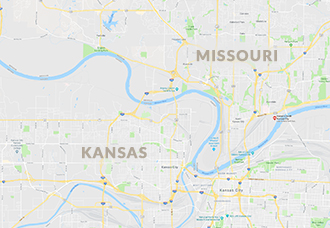
Missouri and Kansas Work Comp: “When Borders Matter”
By Brendan Murphy
Under state workers’ compensation laws, Kansas City area employers face a unique challenge in that they may find themselves subject to both Missouri and Kansas laws. Kansas and Missouri have significantly different work comp regimes, and businesses operating near and across the state border should have some understanding of the laws of each state.
With some frequency, employers and work comp insurers alike can overlook state-specific compliance when procuring and providing work comp insurance policies. The first step employers need to take is to make sure they have the right policy for the state or states in which they operate. A review by an attorney is the best way to confirm this. Simply informing an insurer that a business operates in both states and making sure the right policy is issued can make a big difference should something go wrong down the road.
Some border-adjacent employers might entertain the idea of attempting to limit their business to one side of the state line as a cost-saving or simplification measure. Employers should be cautioned, however, that both Missouri and Kansas apply their laws to (1) injuries occurring in that state, (2) employment contracts executed in that state (unless otherwise specified), and (3) when the principle place of business is in that state. It could be very difficult for some employers near a state line to be sure they will only ever be subjected to claims in one state. Furthermore, unlike civil law (i.e., a “typical” lawsuit) where a plaintiff can only bring suit for the same claim in one court in one state, a work comp claimant can seek a claim in both states at the same time. Claimants can also have their claim denied in one state and still file in another state as long as the meet the criteria for filing in both.
Some basic factors for employers to know about the work comp framework in Kansas vs. Missouri:
- Kansas applies its Work Comp Act to employers with an anticipated payroll of $20,000 in a calendar year while Missouri applies its Act to any business with five or more employees, however, if that Missouri employer is involved in the construction industry, they are covered as an employer if they have one or more employees. If you utilize subcontractors, those individuals who work for the subcontractor may also be considered your employees. If the subcontractor has no workers compensation insurance, those employees of the subcontractor may be deemed your “statutory employees” under applicable work comp law. Statutory employees can include people other than those you label as “employees” on your payroll. The statutory employee doctrine is somewhat complex and businesses are wise to consult an attorney when in doubt.
- Each state has different requirements for reporting injuries for both employees and employers.
- Kansas and Missouri have differing standards for how to determine an injury rating. Kansas utilizes the American Medical Association Guides to the Evaluation of Permanent Impairment to determine percentages of impairment after a workers’ compensation injury. The Guides provide objective criteria for evaluating an injury and determining the percentage of injury to any particular body. A physician conducts or reviews a battery of tests and executes a series of calculations which result in an overall rating. Missouri relies on doctor opinions to determine the percentage of injury to a given body part. Missouri allows physicians to use whatever criteria they chose. This subjective nature of the disability essentially throws open the door to ratings from 1-100% for any given injury, creating uncertainty in anticipating costs to the employer or insurer on the Missouri side. Kansas utilizes the Sixth Edition Guides, which are perceived by many as overly rigid and stingy to claimants. There is a case before the Kansas Supreme Court which challenges the use of the Sixth Edition of the Guides.
- Workers Compensation Acts do not consider which party caused the accident in awarding benefits. This “no fault” approach, however, is not without limits. Both Kansas and Missouri have defenses or partial defenses for circumstances such as failed drug tests, intentional acts, horseplay, and failure to use safety equipment. While many of these factors result in a complete denial of benefits in Kansas, the Missouri statute often only applies a penalty denying a percentage of the benefits. The application of this penalty varies from region to region in Missouri.
- Missouri rules on how a drug test is conducted are fairly relaxed. Traditionally, Missouri’s statute completely denies benefits if an employee fails a drug test and the intoxication was the direct cause of the accident. If the employee fails the drug test but it cannot be proven that the employee would not have gotten injured ‘but for’ the intoxicating effects of the drug(s), then there is a 50% reduction in benefits. Kansas, on the other hand, has a fairly burdensome rule regarding who conducts the drug test and how it is conducted. While a failed test results in a complete denial of claim in Kansas, the strict rules for testing often make it difficult to have tests admitted into evidence to support a denial.
These are only a few ways in which Missouri and Kansas differ in the work comp arena. There are a number of other procedural and pragmatic differences that are best addressed with the assistance of counsel. Martin Pringle’s workers’ compensation attorneys have experience in both Kansas and Missouri and are available to answer any questions you may have.